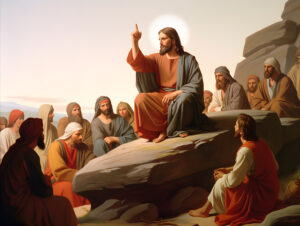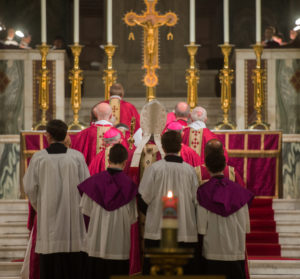Posted by Roberta Grimes • December 07, 2024 • 4 Comments
Jesus, The Source
Oh Lord, my God, when I, in awesome wonder
Consider all the worlds Thy hands have made,
I see the stars, I hear the rolling thunder,
Thy power throughout the universe displayed,
Then sings my soul, my Savior God to Thee,
How great Thou art! How great Thou art!
Then sings my soul, my Savior God to Thee,
How great Thou art! How great Thou art!
When Christ shall come, with shout of acclamation,
And take me home, what joy shall fill my heart.
Then I shall bow in humble adoration
And then proclaim, my God, how great Thou art!
– Stuart K. Hine (1899-1989), from “How Great Thou Art” (1949)
 The problem most people have, I think, is not that they don’t believe in God. As the old saying goes, there are no atheists in foxholes. And many of our days contain lesser crises than foxholes that nevertheless still have us thinking quick little prayers, just in case. Every modern culture also is permeated with the thought of God, since there are old churches, cathedrals, or mosques in every city and town, all over the world, even if some of those sacred buildings now see little use. And our speech is littered with the name of God in more than a hundred languages, used someetimes in ways that are absent-mindedly profane. All of that is still true, so it is certainly true that most people still believe that God exists, even if their belief is only vague; and even if nowadays sometimes that holy name is said without much of a deliberate thought.
The problem most people have, I think, is not that they don’t believe in God. As the old saying goes, there are no atheists in foxholes. And many of our days contain lesser crises than foxholes that nevertheless still have us thinking quick little prayers, just in case. Every modern culture also is permeated with the thought of God, since there are old churches, cathedrals, or mosques in every city and town, all over the world, even if some of those sacred buildings now see little use. And our speech is littered with the name of God in more than a hundred languages, used someetimes in ways that are absent-mindedly profane. All of that is still true, so it is certainly true that most people still believe that God exists, even if their belief is only vague; and even if nowadays sometimes that holy name is said without much of a deliberate thought.
 So, our problem doesn’t seem to be a lack of belief in God, at least in some form. No, but nevertheless I think we all can agree that there is more of a disconnect now between most people and God than there ever has been in living memory. As recently as fifty years ago, in America at least, all those churches in our town and city squares were full on Sundays. It was a simple convention that everyone had some nominal religion, and almost always it was of the Judeo-Christian variety. It is really only in this new century, so I would say in the last twenty-five years or so, that there has been such a major falling-away from our old religions. Many people see this phenomenon as a falling-away from faith in their old religion happening because that old religion no longer makes much sense to them. Thinking about the hundreds of emails that I have received over the past few decades, the one thing that strangers who have written to me have most consistently said was that they could no longer believe in their old religion, but they still believe very much in Jesus.
So, our problem doesn’t seem to be a lack of belief in God, at least in some form. No, but nevertheless I think we all can agree that there is more of a disconnect now between most people and God than there ever has been in living memory. As recently as fifty years ago, in America at least, all those churches in our town and city squares were full on Sundays. It was a simple convention that everyone had some nominal religion, and almost always it was of the Judeo-Christian variety. It is really only in this new century, so I would say in the last twenty-five years or so, that there has been such a major falling-away from our old religions. Many people see this phenomenon as a falling-away from faith in their old religion happening because that old religion no longer makes much sense to them. Thinking about the hundreds of emails that I have received over the past few decades, the one thing that strangers who have written to me have most consistently said was that they could no longer believe in their old religion, but they still believe very much in Jesus.
 And with that, if people felt the need to say more, there often was a sharp subtext of fear. This was especially true of those who were getting up their nerve to leave the Catholic Church, or to free themselves from one of the stricter Protestant churches, from the Calvinists perhaps, or from one of the Evangelical sects, which generally decree damnation for those who have fallen away. So the people who emailed me often have wanted to know whether I believed what their former church believed, and if not then why not; and back in the years when I had more time, I might have had quite lively email dialogues with some of those folks. They wanted their strict former churches to be wrong, and me to be right. But with their possible eternal futures lived in flames now riding on the result of our conversations, some of the men, especially, would battle me pretty hard!
And with that, if people felt the need to say more, there often was a sharp subtext of fear. This was especially true of those who were getting up their nerve to leave the Catholic Church, or to free themselves from one of the stricter Protestant churches, from the Calvinists perhaps, or from one of the Evangelical sects, which generally decree damnation for those who have fallen away. So the people who emailed me often have wanted to know whether I believed what their former church believed, and if not then why not; and back in the years when I had more time, I might have had quite lively email dialogues with some of those folks. They wanted their strict former churches to be wrong, and me to be right. But with their possible eternal futures lived in flames now riding on the result of our conversations, some of the men, especially, would battle me pretty hard!
 And I enjoyed those intellectual squabbles. I am an attorney, after all, and a Biblical scholar with some great quotations from Jesus just waiting in my mind to be shared, so I could readily tell those desperate people, if I was in the right mood, that the fear-based teachings of their prior religion were nothing more than a steaming pile of fear-based excrement. I could happily tell them that if they would stick with Jesus and His teachings, they were going to be just fine.
And I enjoyed those intellectual squabbles. I am an attorney, after all, and a Biblical scholar with some great quotations from Jesus just waiting in my mind to be shared, so I could readily tell those desperate people, if I was in the right mood, that the fear-based teachings of their prior religion were nothing more than a steaming pile of fear-based excrement. I could happily tell them that if they would stick with Jesus and His teachings, they were going to be just fine.
 What is so horribly fearful about the Roman Emperor Constantine’s form of Christianity that still prevails today? Oh, my dear one, let us count the ways in which modern Christianity is based in fear! As is true of every ancient religion, Constantine’s Christianity had to be based in fear as a standard convention. And there was a doozy of a central fear right there and readily available to the First Council of Nicaea in 325 CE, just waiting to be used to fill every future Christian’s heart with the misery of fear and guilt and shame:
What is so horribly fearful about the Roman Emperor Constantine’s form of Christianity that still prevails today? Oh, my dear one, let us count the ways in which modern Christianity is based in fear! As is true of every ancient religion, Constantine’s Christianity had to be based in fear as a standard convention. And there was a doozy of a central fear right there and readily available to the First Council of Nicaea in 325 CE, just waiting to be used to fill every future Christian’s heart with the misery of fear and guilt and shame:
You and I cannot possibly love or trust God at all if we fear God, since love and fear are polar opposites. Without love, we only can tremble in terror before the great Jehovah God! But Jesus came to us to altogether transform our understanding of our true relationship with God into the same perfectly loving Parent-Child relationship that God has with Jesus. He said:
 “I am the true vine, and My Father is the vine dresser. 2 Every branch in Me that does not bear fruit, He takes away; and every branch that bears fruit, He prunes it so that it may bear more fruit. 3 You are already pruned clean because of the Word which I have spoken to you. 4 Now, abide in Me, and I in you. As the branch cannot bear fruit of itself unless it abides in the vine, so neither can you unless you abide in Me. 5 I am the vine, you are the branches; he who abides in Me and I in him, he bears much fruit, for apart from Me you can do nothing. 6 If anyone does not abide in Me, he is thrown away as a branch and dries up; and they gather them, and cast them into the fire and they are burned. 7 If you abide in Me, and My words abide in you, ask whatever you wish, and it will be done for you. 8 My Father is glorified by this, that you bear much fruit, and so prove to be My disciples. 9 Just as the Father has loved Me, so I have also loved you; abide in My love. 10 If you keep My commandments, you will abide in My love; just as I have kept My Father’s commandments and I abide in His love (JN 15:1-10).
“I am the true vine, and My Father is the vine dresser. 2 Every branch in Me that does not bear fruit, He takes away; and every branch that bears fruit, He prunes it so that it may bear more fruit. 3 You are already pruned clean because of the Word which I have spoken to you. 4 Now, abide in Me, and I in you. As the branch cannot bear fruit of itself unless it abides in the vine, so neither can you unless you abide in Me. 5 I am the vine, you are the branches; he who abides in Me and I in him, he bears much fruit, for apart from Me you can do nothing. 6 If anyone does not abide in Me, he is thrown away as a branch and dries up; and they gather them, and cast them into the fire and they are burned. 7 If you abide in Me, and My words abide in you, ask whatever you wish, and it will be done for you. 8 My Father is glorified by this, that you bear much fruit, and so prove to be My disciples. 9 Just as the Father has loved Me, so I have also loved you; abide in My love. 10 If you keep My commandments, you will abide in My love; just as I have kept My Father’s commandments and I abide in His love (JN 15:1-10).
 When I asked my Thomas how each of us should see God, and should relate to God, he showed me the living room of the earliest home that I can remember. The God from the ceiling of the Sistine Chapel with His long, white beard is sitting on the sofa in my long-ago living room, and He is grinning at a toddler who is carrying a plastic cup of orange juice. Then, Whoops! The cup tips, and all that baby’s orange juice spills on the carpet. God’s child starts to cry, but God laughs, and He leans and picks up His baby and cuddles it in His arms. God’s precious baby will learn how to carry juice without spilling it, just as you and I will learn how to grow spiritually. And meanwhile, we are being told now to take it as a core tenet of faith that each of us, individually, is in fact that precious baby. Each of us is God’s Own best-beloved child. So we can love and trust God completely! We can call God our own heavenly Daddy. And we can trust God to safely catch us, every time.
When I asked my Thomas how each of us should see God, and should relate to God, he showed me the living room of the earliest home that I can remember. The God from the ceiling of the Sistine Chapel with His long, white beard is sitting on the sofa in my long-ago living room, and He is grinning at a toddler who is carrying a plastic cup of orange juice. Then, Whoops! The cup tips, and all that baby’s orange juice spills on the carpet. God’s child starts to cry, but God laughs, and He leans and picks up His baby and cuddles it in His arms. God’s precious baby will learn how to carry juice without spilling it, just as you and I will learn how to grow spiritually. And meanwhile, we are being told now to take it as a core tenet of faith that each of us, individually, is in fact that precious baby. Each of us is God’s Own best-beloved child. So we can love and trust God completely! We can call God our own heavenly Daddy. And we can trust God to safely catch us, every time.
Then sings my soul, my Savior God to Thee,
How great Thou art, how great Thou art.
Then sings my soul, my Savior God to Thee,
How great Thou art, how great Thou art!
– Stuart K. Hine (1899-1989), from “How Great Thou Art” (1949)
(Many photos are from Vecteezy.com)
What is the difference between religion & spirituality?
No middle man between you and God.
We are ALL Gods chosen people. Not just Israelis.
Jesus reason for demonstrating “that they would survive their deaths,” did it have to be so cruel and painful?
Chris, his physical death certainly had to be public so no one could deny it really happened. Am not sure if there were better options at the time that would meet this criteria. We might also consider that the very act of subjecting Himself to such treatment while demonstrating love and forgiveness serves as an excellent illustration of his teachings.